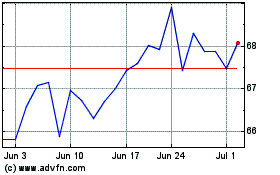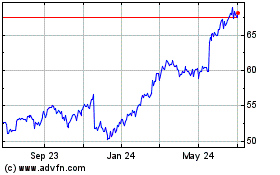Today's Top Supply Chain and Logistics News From WSJ
January 30 2018 - 7:31AM
Dow Jones News
By Paul Page
Sign up: With one click, get this newsletter delivered to your
inbox.
Wal-Mart Stores Inc. is tightening delivery requirements for its
suppliers still more as it looks to get its supply chain moving
faster and leaner. The retailer will tell suppliers to deliver more
goods to warehouses exactly on-time or face penalties, the WSJ's
Sarah Nassauer and Jennifer Smith write, in a new sign of how
e-commerce competition is raising pressures across distribution
channels. The new guidelines call for large suppliers to deliver
full orders within a specified one- or two-day window 85% of the
time or face a fine of 3% of the cost of goods. That's up from
earlier thresholds, and Wal-Mart is also boosting the demand on
smaller suppliers from 33% to 50% on-time delivery. The standards
are aimed at keeping shelves stocked and inventory low, a tough
combination in retail but one that's increasingly important as
consumers scan both stores and websites for available goods.
Suppliers will get something in return: data on sales and inventory
that should help them put the right goods in motion.
A gold rush for cobalt is underway. Booming demand for cellphone
and electric-vehicle batteries is driving a once-unthinkable growth
in companies focused entirely on the metal, the WSJ's Scott
Patterson reports. New and existing companies are building up a new
global supply chain built up from nearly nothing and bolstered by
rapidly rising values of the metal used in lithium-ion batteries.
One company, Cobalt 27 Capital Corp., deals only in cobalt and
holds one of the world's largest stockpiles of the metal spread
between warehouses in Baltimore, Rotterdam and Antwerp. One
commodities group expects annual demand for cobalt to triple to
roughly 100,000 metric tons by 2030. Mining giant Glencore PLC says
there could be shortage as electric-car production ramps up unless
a new supply is discovered. Meantime, Toronto-listed First Cobalt
Corp. is returning to an old silver mine where it had found cobalt
and either left in the ground tossed into waste piles.
Big new investment is going toward blurring the lines between
digital and physical retail business in Asia. An investor group
that includes Chinese e-commerce giant JD.com Inc. and Tencent
Holdings Ltd. will pay $5.37 billion for a 14% stake in Wanda
Commercial Properties Co., China's largest mall developer. Wanda is
benefiting from an escalating war for consumers and data between
Tencent and Alibaba Group Holding Ltd., the country's two largest
internet companies, the WSJ's Wayne Ma and Liza Lin report, and by
the growing push by e-commerce companies into the world of
brick-and-mortar retailer. The deal gives JD.com and Tencent a
partner in China's shopping-mall business as they seek to match
Alibaba's move into physical stores, a drive that comes as
Amazon.com Inc. is adding to its physical presence in the U.S. with
its Whole Foods purchase. The operators in China are going further,
aligning with a developer behind the retail properties.
ECONOMY & TRADE
Some U.S. importers may find the legal ground at the border
growing more precarious. Recent court rulings have opened the door
to more whistleblower lawsuits over goods that have been mislabeled
to avoid customs duties. The cases take an expanded view of the
False Claims Act, the WSJ's Henry Cutter writes, encouraging
lawyers that specialize in the anti-fraud cases and raising risks
for corporations as they match documents to the goods they move
into the country. The FCA allows people who allege wrongdoing
against the government to sue on its behalf -- and share whatever
funds are collected. The shift came last October when the Supreme
Court declined to hear an appeal by Victaulic Co. in a case
involving imported pipe fittings. Recent cases like one involving
may broaden the impact of whistleblower cases across the supply
chain. In one case, a garment wholesaler failed to note several
signs that overseas suppliers were avoiding duties by submitting
fake invoices to customs.
QUOTABLE
IN OTHER NEWS
Apple Inc. is cutting production of the iPhone X due to weak
demand. (WSJ)
Americans' saving rate dropped to a 12-year low last month as
consumer spending increased. (WSJ)
Manufacturing activity across Texas retreated this month after
reaching an 11 year high in December. (WSJ)
Negotiations to revamp the North American Free Trade Agreement
pushed through a sixth round as tensions flared between the U.S.
and Canada over auto-industry rules. (WSJ)
Packaging company WestRock Co. will buy KapStone Paper and
Packaging Corp. for about $3.5 billion, gaining scale as online
shopping lifts demand for packaging. (WSJ)
China's JinkoSolar Holding Co. said it plans to open a solar
plant in the U.S., a week after President Donald Trump imposed
tariffs on imported solar panels. (WSJ)
The maker of Keurig coffee machines is buying Dr Pepper Snapple
Group Inc. in what will become the largest soft-drink deal ever.
(WSJ)
Apple Inc. is slashing production of its iPhone X in the current
quarter by half the level it had planned three months ago. (Nikkei
Asian Review)
JD.com plans to place a logistics center in the Los Angeles
area. (Bloomberg)
Prologis Inc. plans to buy a 350,000-square-foot warehouse in
New York's Queens borough for about $265 million. (Crain's)
Amazon is opening its fourth distribution center in the U.K.'s
Midlands region. (The Independent)
Pakistan repealed taxes and duties on cotton imports that were
aimed at protecting the country's producers. (Sourcing Journal)
Cash-strapped Samsung Heavy Industries is seeking to raise $1.5
billion in a rights issue after reporting its third straight annual
loss. (Finance Asia)
The U.S. Army Corps of Engineers approved the Port of Virginia's
plan to widen and deepen the Norfolk Harbor. (American Shipper)
TOTE Maritime is scrapping orders for four container ships from
the Philly Shipyard because terminal upgrades at Honolulu haven't
been completed. (Journal of Commerce)
Norway's MPC Container Ships began trading shares on the Oslo
Stock Exchange. (Lloyd's List)
A new report says Chinese companies hold about 10% of the
container-handling capacity at European ports. (Shipping Watch)
ABOUT US
Paul Page is deputy editor of WSJ Logistics Report. Follow him
at @PaulPage, and follow the entire WSJ Logistics Report team:
@brianjbaskin , @jensmithWSJ and @EEPhillips_WSJ. Follow the WSJ
Logistics Report on Twitter at @WSJLogistics.
Write to Paul Page at paul.page@wsj.com
(END) Dow Jones Newswires
January 30, 2018 07:16 ET (12:16 GMT)
Copyright (c) 2018 Dow Jones & Company, Inc.
Walmart (NYSE:WMT)
Historical Stock Chart
From Aug 2024 to Sep 2024

Walmart (NYSE:WMT)
Historical Stock Chart
From Sep 2023 to Sep 2024
